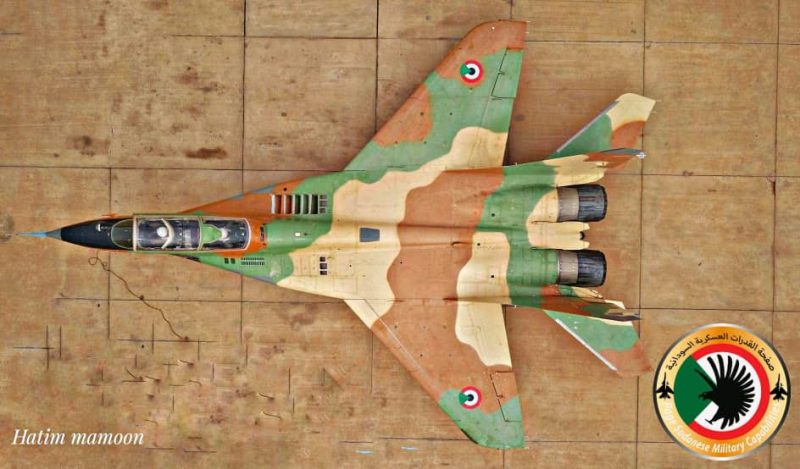The Sudanese Air Force has deployed its MiG-29 fighter jets in support of the Sudanese Army’s ongoing military operations against the ‘Rapid Support Forces’ (RSF) militia in several parts of the country. The RSF is a paramilitary group that operates under the authority of the Sudanese government and has been involved in multiple conflicts and human rights violations in the country.
On April 15, videos of Sudan’s MiG-29 Fulcrum fourth generation fighter aircraft operating over the Sudanese capital Khartoum and firing air to surface projectiles, as part of a much larger air campaign by the Sudanese Military aimed at countering the Rapid Support Forces (RSF) militia group
The deployment of the MiG-29 fighter jets marks a significant escalation in the conflict and highlights the Sudanese military’s determination to take strong action against the RSF militia.
The MiG-29 is a modern and highly capable fighter jet, equipped with advanced avionics, weapons, and sensors. Its deployment in the conflict zone is a clear indication of the Sudanese Air Force’s commitment to providing air support to ground forces in the fight against the RSF.
Sudan acquired the MiG-29s from 2003-2004, and is one of five African countries to operate the MiG-29, with neighbouring Eritrea, Egypt and Libya as well as nearby Algeria.
Also, the Sudanese Air Force relies greatly on Chinese and Soviet era aircraft. Other aircraft in it’s inventory includes MiG-21s, MIG-23s, Nanchang Q-5, Shenyang J-6, Chengdu J-7, Sukhoi Su-24, and Sukhoi Su-25.
The MiG-29 has been one of the most popular Russian combat aircraft for export, and is a medium weight multirole jet with a formidable fight performance including very high manoeuvrability and a high speed and altitude ceiling.
While Sudan’s MiG-29s were not as capable as the MiG-29M deployed by Egypt, but they are still much more capable than the original MiG-29A and are equipped with modern R-77 active radar guided missiles with 110km engagement ranges against enemy aircraft.
Egyptian Air Force MiG-29M are roughly analogous to Russia’s most advanced MiG-35s, are relatively new, and feature modern capabilities.
Sudan and Algeria rely on other aircraft classes for a strike role such as the Su-24M and Su-25, and in Algeria’s case the Su-30 as well, meaning the MiGs are primarily relied on for air superiority in both cases.
This contrasts to the Egyptian MiG-29 fleet which appeared to be largely equipped for anti shipping roles.
Several aircraft types were captured and destroyed in the ground by the RSF when they overran some military bases operated by the Sudanese military in Kobar Bridge in Khartoum.
Two Mi-24 Hind attack helicopters were captured on the ground. However, those appears not be airworthy.
The RSF is a powerful and well-equipped paramilitary force that has been accused of numerous human rights violations, including extrajudicial killings, torture, and rape. The group has been involved in conflicts in Darfur, South Kordofan, and Blue Nile states, and has been accused of committing atrocities against civilians in these areas.
The use of the MiG-29 fighter jets by the Sudanese Air Force against the RSF is a significant development in the ongoing conflict in Sudan. The deployment of airpower in the conflict raises concerns about civilian casualties and human rights violations, as the RSF has been known to use civilians as human shields and to carry out attacks in civilian areas.
The Sudanese government has been under pressure from the international community to take action against the RSF and other paramilitary groups operating in the country. The United Nations and other international organizations have called for an end to human rights abuses and for those responsible to be held accountable.
The deployment of the MiG-29 fighter jets in the conflict underscores the importance of finding a peaceful and sustainable solution to the conflict in Sudan. The international community has called for a cessation of hostilities and the resumption of dialogue to address the underlying causes of the conflict.
Efforts to achieve lasting peace and stability in Sudan require a comprehensive approach that addresses the underlying causes of the conflict. It is crucial for Sudanese stakeholders to engage in inclusive dialogue, find peaceful means to address their differences, and work towards a sustainable solution that can bring lasting peace to the country.
